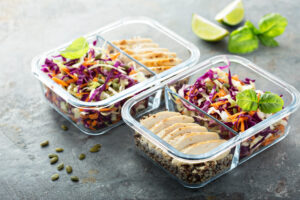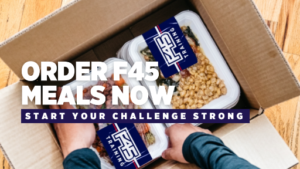Fact or Fiction: Your Weekly Nutrition Roundup (week 3)
August 23 2023 | Ashleigh Kidd, RD, LDN
Hey team! Back here again to separate fact from fiction when it comes to nutrition. Want your burning questions answered? Head to our IG (@f45Training) every Wednesday to play Fact or Fiction and submit your nutrition questions to be answered by your Challenge Dietitian!

Alright, let’s play!
Fact or Fiction: You should eat within an hour after working out
Fact!
After any workout, it’s key to get some carbs and protein in! Aim to have a balanced meal rich in protein and fiber within 60 minutes of ending your workouts, especially if strength training. i.e. egg and black bean tacos with roasted kale.
If you’re unable to have a full meal within 1 hour of working out, go for a carbohydrate rich snack (i.e. banana, milk, yogurt, or protein shake).

Fact or Fiction: I have to meal prep and eat the same things to see results
Fiction!
Satisfaction is SO key when building health habits (it’s not realistic that you’ll want to eat the same foods over and over and over again forever). Learning to put together a meal that is balanced AND satisfying will help prevent boredom and leave you feeling your best physically and mentally.
Something that I highly recommend is “food prepping”. If you’re not someone who wants to prepare all your meals at once for the week, this is much more flexible option. It can look like prepping your foods for the week so that they are easy to grab and fix each day. i.e. washing and chopping your produce so that part is already done for you when it comes time to prepare your meal.
Including a variety of foods and also your favorite foods is one way to ensure that the health habits you’re building are sustainable.
Check out our “How to build a balanced and satisfying plate” blog , and refer to our recipe library on the challenge app for recipe inspo!

Fact or Fiction: When you have fitness/health goals you should avoid events/gatherings to stay on track
Fiction!
Here are 4 tips to keep in mind:
- Leading up to the event (or holiday), resist the urge to skip meals or restrict in anticipation of the event. Instead, eat how you normally would leading up to the event or holiday, aiming for balance at most meals (protein, fat, carb & fiber). When we restrict, we actually put those foods on a pedestal, and we’ll likely overeat or binge when we get around those foods again.
- Give yourself permission to eat your favorite foods at the event (and leave the ones you don’t care for!) Avoiding your favorite foods will again likely result in overeating them later. Remember, there are no good/bad foods. Eat, enjoy, and move on. It’s one meal at one event.
- Practice mindfulness: Asses your hunger before, during, and after your meal can help you to feel more in control. Remember that seconds will always be there. Once you’ve finished your meal, take 10-15 minutes and remove yourself from the dining area. If you’re still hungry, go get more, if you’re not, enjoy the rest of the event!
- Remember that the event isn’t just about the food. Try to focus on being present with your friends, fam, or colleagues.

Fact or Fiction: Carbs aren’t good for you
Fiction!
Every week we get a variation of this question/statement, and it’s understandable because of the misinformation all over the internet (and what a lot of us grew up learning!). Carbs are absolutely essential for our bodies to function properly. They are our bodies main and preferred energy source.
When we cut out carbs there are possible risks and side effects like:
- Losing out on fiber, antioxidants, whole grains, and vitamins/minerals
- Increased fatigue
- Blood sugar imbalances
- Hanger (aka being hangry, yes this is a real thing!). Our mood is greatly effected when we don’t eat enough or any carbohydrates
- Weight cycling: when we cut out macronutrients (such as carbs), it’s not sustainable. So you’re left starting the diet cycle over and over again. This can effect our metabolism, hormone function, mental health, and increased risk of developing a chronic disease.
There are different kinds of carbs. Some are higher in fiber and keep you fuller longer, and might even have some protein. While others have less fiber and your body will use them faster. Both of these offer different nutrients and can fit into your daily life.
Rather than good/bad, I encourage you to look at carbs for what they are: fuel. Check this blog out to learn more.

Have you ordered your meals for the second half of Challenge? Check your area here for suppliers here.
For additional nutrition and wellness support, you can always check out F45 Articles for tips on how to improve your nutrition and relationship with food.
